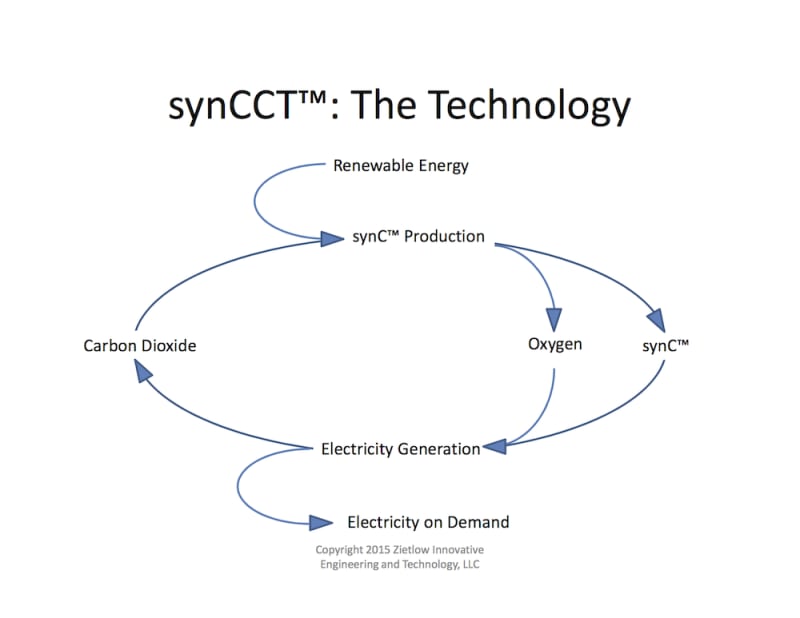The Problem
• Conventional sources of electricity are ultimately unsustainable.
o Nonrenewable
o Generate pollution and waste
o Toxic and dangerous materials
• Renewable energy sources, such as wind and solar power, are often not available when and where needed, .
• Without grid-scale electricity storage, the amount of electricity from wind and solar power is ultimately limited.
• Conventional grid-scale energy storage technologies only partly solve the shortcomings of renewable energy sources.
o Limited storage times
o Not transportable, requiring more electric transmission lines
• Developing grid-scale technologies are inferior.
o Consume large quantities of water.
o Production is complicated, expensive & inefficient.
o Chemicals involved are hazardous.
o Limited infrastructure exists.
The Solution
synCCT™ (synthetic coal cycle technology™) is fully sustainable and makes essentially unlimited electricity from renewable energy sources available most anytime and anywhere. synCCT™ is or can (be):
• Carbon-neutral.
• Stored indefinitely.
• Transported long distances without electrical transmission lines.
• Relatively nontoxic and safe.
• Use existing transportation and energy infrastructure.
• Consume little or no water.
• Generate essentially no:
o Greenhouse gases.
o Pollution.
o Material waste.
How It Works
The synCCT™ process, illustrated in the attached graphic, captures carbon dioxide from a source, such as an electric power plant, and transports it to synCCT™ production, a chemical plant that utilizes renewable energy to produce synC™ (synthetic coal™) and oxygen. synC™ is transported back to the electric power plant. The oxygen may be released to atmosphere or captured and utilized directly. At the electric power plant, synC™ is oxidized by combustion or other means, such as a fuel cell, to produce electricity on demand, generating carbon dioxide. The carbon dioxide is captured and the process starts over again.
synCCT™ effectively stores, transports and releases intermittent renewable energy on demand, while recycling the materials used. No material is consumed or generated. Like the carbon cycle in nature, the process is sustainable, carbon-neutral and pollution-free.
Most of the technology and infrastructure to implement synCCT(TM) already exists. The bulk storage, transportation and handling of carbon, carbon dioxide and oxygen are all commercial technologies. The technology and infrastructure for generating electricity from carbon, as coal, also exists, and carbon dioxide capture technology is being developed at or near commercial scale. The only major piece of this process needing significant development for commercialization is synC™ production.
Markets
Target customers are electric utilities, both generators and providers. Addressable markets includes both developing and industrialized countries, especially where the following conditions exist:
• High fossil fuel costs, either inherently or by virtue of carbon penalties
• Desire to minimize or discontinue the use of nuclear power
• Desire to generate at least 10% of electricity from non-hydro renewable energy sources
• Significant renewable energy resources
• Scarce water resources
• Developed transportation infrastructure
The most likely addressable markets are Japan, Europe, Australia, Brazil, Philippines, China and Pacific and Caribbean island nations. A niche market in the US, curtailed wind energy is worth approximately $400 million per year wholesale.
Like this entry?
-
About the Entrant
- Name:Douglas Zietlow
- Type of entry:individual
- Software used for this entry:Microsoft Excel
- Patent status:pending

